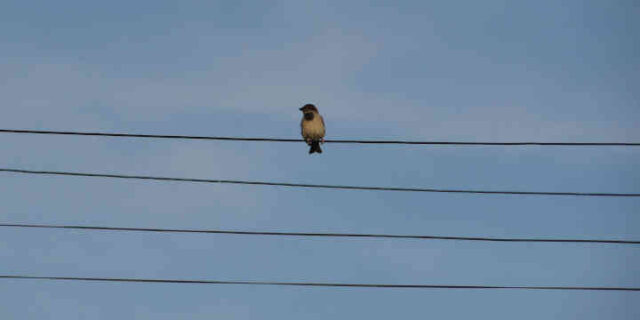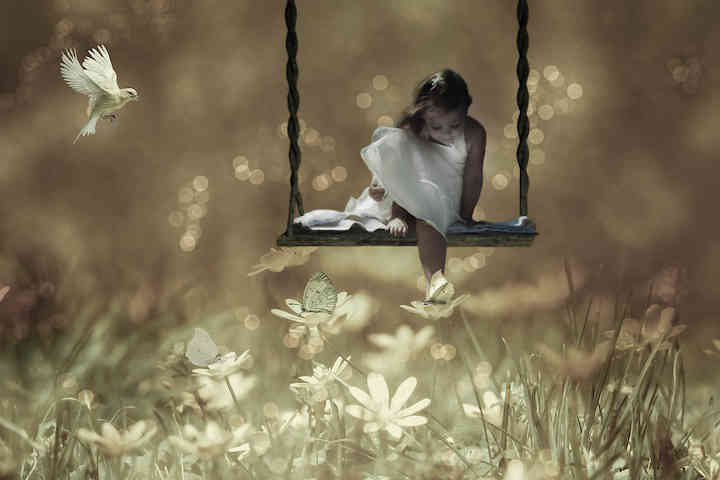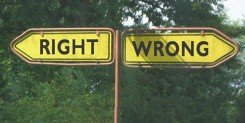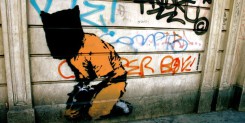“Like a bird on the wire
Like a drunk in a midnight choir
I have tried in my way to be free”
Leonard Cohen’s song touches something in many of us.
We want to be free. Free of the baggage that holds us back, from …… what? Doing what we want? Being ourselves? Making our lives count for something?
Somehow, it seems, to be truly human means to long for something more.
How can we understand this? And live accordingly?
What makes us more than animals?
Our evolutionary history means there are many ways in which we are similar to animals. But anthropologists and neuroscientists say there are many ways in which we are different.
- Obviously our brains are bigger. We have procedural memory which allows both humans and animals to develop non-conscious skills such as walking or swimming. But humans also have declarative memory, which allows us to remember facts, form beliefs and think independently. Thus we can reason and do science. These brain capacities are the basis of other abilities. It may be that some animals have some aspects of declarative memory, but not to the same degree.
- Speech and language are also important to the development of culture and other factors below. Animals can communicate, but don’t appear to have language.
- We have the ability to think abstractly and symbolically. This allows us discern what other people are thinking and to make plans for the non-immediate future.
- We have a higher form of consciousness, so we are aware of ourselves. We think about meaning and happiness, we tell stories. And we have developed art, music and religion.
- Not only have we developed culture (the way we do things and think), but we think about it and teach it to the next generation so our emotions reinforce and regulate our social behaviour.
- Humans have a capacity for pleasure and love which animals don’t seem to have to the same degree.
All this leads to the feeling most of us have, that people really matter. We may have different views about hurting or killing animals, but we almost always think hurting and killing humans is much worse. Our laws reflect this.
I can remember, back in 1997, when a landslide destroyed several ski lodges in Australia’s ski fields. 18 people were killed. Rescue crews searched among the debris for two days when they found one man alive in the rubble. Stuart Diver had been lying buried in sub zero temperatures alongside his wife, Sally, who was dead. He was 2 metres beneath the surface and underneath 3 concrete slabs that were in danger of moving again, crushing Diver. A tense and delicate rescue operation began, carefully tunnelling under the slabs from one side. It was a Saturday, and like millions of Aussies, I watched the TV all day hoping against hope he could be brought out alive. I recall the feeling of relief and elation when I watched him pulled from the rubble after 65 hours. People really matter. Stuart Diver was totally unknown to me and most Australians, but we all knew his life really mattered, and was worth the enormous effort that went into rescuing him.
And most of us want to feel that we really matter. Perhaps this is our deepest longing. To matter to someone. To have significance in the scheme of things. For our lives not to pass unnoticed and uncared for.
Human flourishing
All animals, including humans have obvious biological needs – food & water, safety, shelter, and a mate. If any of us lack these, it is less likely that we’ll procreate and continue our species or family.
But people are capable of much more than animals and we need much more than this to flourish. The classic statement of these “higher” aspirations is Abraham Maslow’s hierarchy of needs. Maslow suggested that once “lower” basic needs are fulfilled, humans aim at higher needs that we find fulfilling in ways beyond what animals could seek.
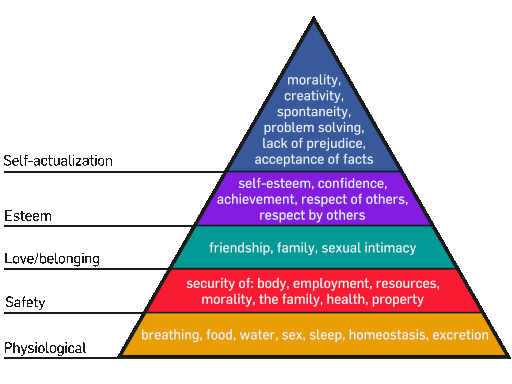
Maslow’s hierarchy has been criticised in recent years as not being academically rigorous, but studies suggest that if not interpreted too strictly, the basic ideas are still valid.
Some critics say, on the basis of evolutionary psychology, that finding and keeping a mate and procreating are more evolutionarily advantageous than “self actualisation” and should be considered the highest needs.
But others disagree, arguing that humans can “rise above” adaptation and natural selection (on occasions) and seek greater goods. In fact, positive psychologists tell us, this is only way we can truly flourish and attain wellbeing.
Freedom and human flourishing
There are different levels of freedom.
At the basic level, like animals, we need to be free to seek the necessities of life.
Democracy is an attractive form of government because it provides freedom from arbitrary and coercive authority, freedom of speech and freedom to pursue happiness.
These are all important, but real flourishing goes deeper. We humans long to be free to live our lives and meet our aspirations. We aspire to beauty and relationships, to meaning and lives that are not destroyed by evil. We long to be free of external constraints and our own failings so that we can pursue these higher goals.
Freedom and truth
We want to be authentic. Which means being “real”. Really ourselves, and real to the world around us.
We don’t want to be out of touch with reality, believing conspiracy theories, fooled by the fake or taken in by silly ideas others buy into. We want our lives to be meaningful, but we want that meaning to be real and true.
We want truth and reality, but we are suspicious of those who tell us their truth. We want to be free to find our own truth.
But truth is a slippery and uncomfortable word these days. Friedrich Nietzsche argued that truth takes away our freedom, by forcing us to be confined to what is true. Postmodernism throws doubt on our ability to know objective truth. So for some of us, freedom and truth are not entirely compatible.
Yet at the same time, truth can set people free from delusion and unhealthy dependence. Recognising truth can be the first step in positive behavioural change, or positive action to reverse a hurtful situation. For example, escaping domestic abuse can depend on recognising the truth about the situation. Failure to recognise the true state of affairs can be dangerous.
So despite the doubts, it seems that to be free we need to know truth.
Freedom and relationships
We seem to be made for relationships. Our love of love stories show this. The positive psychologists confirm it – one of the keys to human flourishing and wellbeing is having good close relationships, including a “significant other”, or in older language, a life partner.
Close relationships unleash great power, for good and for evil. People will do heroic things for love. Loving and being loved can bring out the best in us; we can be at our most unselfish when we love someone. Our behaviour is more determined by what we love than by what we believe.
But we all know that love can turn sour. People will kill or lash out for love, or out of thwarted love. Relationships can become abusive. These things occur when one partner doesn’t give the other freedom to be themselves, but instead wants them to conform to their selfish desires.
Good relationships require us to treat the other as a person with their own aspirations and longings, and not as an object of our aspirations.
We long for good relationships, but they require us to respect each other’s freedom.
Freedom and goodness
We find evil actions shocking. We feel for those suffering violence, injustice or calamity, especially if we can relate to them in a particular way (e.g. they have children the same age as ours, or they have values similar to ours).
It seems that we see evil as an intrusion into normal life. Evil is the way things ought not be. A morally good life is a humanly good life.
Of course we don’t want to be too good. We want to be free to cut a few corners without doing evil, to break out occasionally. Just as long as we don’t hurt others, which would then be evil.
Evil destroys what we love, whereas goodness builds up and strengthens what we love. Goodness is primary and evil is a distortion.
Most of us would like to have a good reputation. We want to be good. We want to improve when we fail. But we don’t like other people pointing out our failures. That is a threat to our independence and autonomy.
Out freedom and autonomy allow us to choose to do good or evil. But when we choose evil, we often impinge on other people’s freedoms. So we generally accept laws and societal norms that curtail our freedoms a little for the common good.
All this raises questions about what makes something morally good or evil. We generally agree on the big issues – murder, abuse, theft and dishonesty are wrong – while we may disagree on some of the details. We can explain why we feel obligated to accept these ethical views in terms of survival and the social contract. But it isn’t so clear why we should feel obligated to follow them if we can get away with it.
So many of us long for a better world. But morality puts limits on our freedom. We generally accept the necessity for this, but it does raise questions we find difficult to answer.
Satisfying our longings
So to be human is to long for something more than mere existence. Survival and natural selection may lead us to want to live well and reproduce. But our humanness leads us to want to be free, seek truth, love and be loved, and seek a better world.
But are these hopes and longings illusory? Just “fitful dreams“, as Jackson Browne once sang?
Our thoughts rebel against that idea, yet we know only too well that truth, justice, love and good are scarce treasures in our world. Too often “the rich get richer and the poor get the picture” (Midnight Oil). And we know sadly that “we measure our days out in steps of uncertainty” (Al Stewart).
This one place where christian theism offers hope that seems (to me) to be beyond what atheism can offer.
Christian theism says that we can seek truth and find it, we can love and be truly loved, one day all things will be put right. We are noticed and loved. Our lives matter. And we can be truly free. All because we are created by a God who loves truly and knows right and wrong truly. Who sets us free to be truly ourselves, forever. Freedom, truth, love and goodness will truly be permanent.
Logically, atheism cannot be based on true universal truth and goodness. Free will is just an illusion for our brains are physically determined. We have to create goodness, truth, love and freedom for ourselves. They are subjective. And they can only be temporary.
None of this proves the truth or otherwise of either christian theism or atheism. But it does suggest that christian theism fulfils our aspirations in ways that atheism cannot.
Read more
- Our Deepest Desires: How the Christian Story Fulfills Human Aspirations. Gregory Ganssle.
- Not just intelligence: Why humans deserve to be treated better than animals. Juan Carlos Marvizon, Ph.D. Speaking of Research
- How do we know right and wrong? and Do humans have free will?. On this website.
- Declarative memory. Science Direct.
- Maslow’s hierarchy of needs. Wikipedia.
Photo: MorgueFile. Maslow’s hierarchy diagram: By Factoryjoe in Wikipedia.
Feedback on this page
Comment on this topic or leave a note on the Guest book to let me know you’ve visited.
